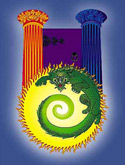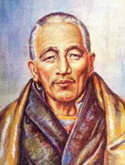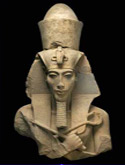Before treating this subject, I feel that I ought to give some explanation. Perhaps it may be considered an act of presumption on my part to dare take up such an imposing theme. Indeed it would be, if I presumed to speak as the “mouth-piece” of Isaiah. But that certainly is not the case. It seems to me that every Jew who desires to live his religion in such a way as to be fully aware and worthy of it, has not only the right but indeed the duty to ask himself:
“How can and should one apply the teachings and the examples of the Masters and Prophets of ancient times to the present day world? How would they solve the religious, intellectual, moral and social problems of our times, with regard to which we are obliged to ‘take position’?
The very fact of asking ourselves these questions safeguards us to a great extent from falling into the danger which unfortunately overtakes so many Jews today, the danger of allowing themselves to be seduced by ideologies and ways of life quite contrary to our faith and our traditions.
I should be glad if this paper would offer the occasion for an exchange of ideas, in group meetings and in private “dialogues,” and this help to see our way and to play our part in the present grave crisis of humanity.
I also want to point out that I do not intend to solve the much debated question as to the author or authors of the text contained in the Bible under the title, The Book of Isaiah. As you know, most biblical scholars attribute the first thirty nine chapters of the Book of the Prophet Isaiah, son of Amotz, who lived in Jerusalem in the eighth century before the present era, while the author of the remaining chapters is presumed to be the Isaiah of the Exile, who lived in the sixth century, probably in Babylon. Certain biblical critics suggest other subdivisions and attributions. (See, among others, Martin Buber, The Prophetic Faith p. 205).
For the present purpose it is not necessary to adopt any definite attitude with regard to this problem. I am taking as my text The Book of Isaiah as a whole, considering it as the highest and most universal expression of the prophetic spirit of Israel.
Before attempting to interpret what might be the message which an enlightened prophet, such as Isaiah, would give us in this critical time, I think it necessary to indicate a few general principles of interpretation that have to be applied to the messages given us through the centuries by the prophets and seers.
First of all we have to remember that their messages do not have only one meaning, but often they have several, interwoven one into the other in diverse ways. This is not a mere hypothesis, but a fact demonstrated both by careful and unbiased study of the messages, and also by the definite statement of some of their authors.
The most explicit statement has been given by the inspired poet Dante Alighieri in one of the philosophical treatises contained in his Convivio (I,2) where he enumerates the four different meaning of poetry: the literal, the allegorical, the moral, the analogical.
His writings can be understood and should be interpreted chiefly in four senses. The first is called the literal sense, and this does not go beyond the actual letter, as it is merely the narrative of the story which you are dealing with. The second sense is called the allegorical and is the meaning which is hidden beneath the mantle of the story, and is in fact a truth wrapped in a beautiful falsehood.
As when Ovid says that Orpheus with his lyre persuaded the wild beasts, the trees and the stones to move; what he really means is that the wise man can, with the instrument of his voice, tame and make humble the cruel hearts of others, and at his wish command those who have little reason and are almost like stones. The third is called the moral sense, which readers should diligently find out in the writings for the benefit of their pupils.
The fourth sense is called the analogical, that is, the super-sense; and this is found in writings of a spiritual import, which in the literal sense refers to things of the eternal glory. This is to be found for instance in the song of the prophet who says that in the Exodus from Egypt of the people of Israel, Judea is made free and holy. And this while it is true literally, is nonetheless is true in the spiritual implication, that is, when the soul turns away from sin it becomes holy and free in its own powerful right.
This method of multiple interpretation has been expounded and applied to the Bible by several Masters of Jewish learning and particularly by the great philosopher Moses Maimonides. His ideas on this subject have been clearly summarised by Professor Isaac Husik in his valuable book: A History of Medieval Jewish Philosophy (The Jewish Publication Society of America – Philadelphia 1944).
This method in general, of quieting the doubts of the perplexed is the old one – as old as Philo and beyond – of regarding Biblical phrases as metaphors and allegories, containing an esoteric meaning beside or opposed to the literal. Accordingly, he lays the greatest stress on the explanation of Scriptural homonyms, as he calls them, borrowing an Aristotelian term. A homonym is a word which has more than one meaning: a word which denotes several things having nothing in common. Thus when I apply the word ‘dog’ to the domestic animal we know by that name, as well as to Sirius, known as the ‘dog–star’, I use ‘dog’ as a ‘homonym’, the star and the animal having nothing in common.
There are, besides, certain passages in the Bible which while having an acceptable meaning when taken literally, contain, besides, a deeper signification which the practiced eye can detect. Thus the description of the harlot in the seventh chapter of Proverbs, there is beside the plain meaning of the text, the doctrine of matter as the cause of corporeal desires. The harlot, never faithful to one man, leaving one and taking up with another, represents matter, which, as Aristotle conceived it, never is without form and constantly changes one for another.
There is really nothing new in this, and (Philo apart, whom Maimonides did not know) Ibn Daud anticipated Maimonides here also in the meanings of the term ‘homonym’ as the basis of this method of interpretation.
Maimonides’ purpose is to teach a spiritual conception of God. Anything short of this is worse than idolatry. He cannot reconcile the Bible to such a view without this ‘homonymic’ tool hence the great importance of this in his system, and he actually devotes the greater part of the Guide to a systematic and exhaustive survey of all terms in the bible used as ‘homonyms’. (p. 240-241)
It is not easy to ascertain to what degree each prophet and inspired man is clearly conscious of the various meanings contained in his messages, but this knowledge is not essential to their interpretation and application. As Dr. Baeck has lucidly pointed out:
“Whether the prophets consciously meant to convey in their speeches all that we find, or can, or ought to find in them, is of minor importance. What matters is not the author’s intention but his achievement. In this creative endeavor lies the strength of the genius; almost unconsciously he creates truths which have deeper meanings than he intended. That which was to him a limited metaphor may become for us a universal symbol (p 44: Leo Baeck: The Essence of Judaism, Schocken Boeks-New York).
And with particular reference to Isaiah, Claude G. Montefiore has previously written:
“In spite of his monotheism, the prophet does not hesitate to retain the old conception of Deity inhabiting a particular place and revealing himself there in visible effulgence of supernatural light. God is not, as in Ezekiel, located absolutely within the temple; Deutero-Isaiah’s idea apparently was that he would be poised in a cloud of radiant light above Jerusalem. Yet how far all this is pure metaphor and symbolism, and how far literal. It is very difficult to determine, and perhaps the prophet himself could scarcely have told us. There is no other writer in the Hebrew Scriptures whose language so frequently passes and re-passes from the material to the spiritual, or who hovers so habitually upon the confines of either.” (C.G. Montefiore – Lecture on the Origin and Growth of Religion as illustrated by the Religion of the Ancient Hebrews, Williams & Northgate, London 1892 –The Hibbert Lectures 1892, p. 282).
Given these examples, we can feel reasonably free in interpreting the sayings of the prophets, particularly in drawing a distinction between the literal, the local, and historical contents and their truly universal and prophetic purport.
After these necessary clarifications, let us examine briefly the most important applications of the teachings and admonitions contained in the Book of Isaiah with regard to contemporary problems in the fields of religious, social and political life, and with regard to the mission of the Jewish people today.
1. RELIGION
Isaiah’s statements with regard to religion are so clear, decided, and outspoken, that it is not difficult to apply them, nor to infer with a fair degree of certainty what attitude he would assume now. We cannot doubt that today he would condemn, no less than he did in the past, exclusively formal prayers and ceremonies, above all when they serve to hide the evil conduct of those who prefer them. He would again endeavour to urge men towards a vital and spiritual religion. He would teach them that they can and should commune directly with their God, Who is ever-ready to give fresh revelation and guidance according to the new needs of those who address themselves to Him. The words which we find in the Book of Isaiah are strong; we might even call them rude and violent.
“To what purpose is the multitude of your sacrifices unto me? saith the Lord. I am full of the burnt-offerings of rams, and the fat of fed beasts, and I delight not in the blood of bullocks, or of lambs, or of he-goats. When you come to appear before me, who hath required this of your hand, to tread my courts? Bring no more vain oblations; incense is an abomination unto me; the new moons and Sabbaths, the calling of assemblies, I cannot [bear]; it is iniquity, even the solemn meeting. Your new moons and your appointed feasts my soul hateth: they are a trouble unto me; I am weary to bear them. And when ye spread forth your hands, I will hide mine eyes from you: yes when ye make many prayers, I will not hear: your hands are full of blood. Wash you, make you clean, put away the evil of your doings from before mine eyes, cease to do evil. Learn to do well: seek judgment, relieve the oppressed, judge the fatherless, plead for the widow.” (Chapter 1, 11-17)
Since this point is of vital importance, let us stop to examine its meaning, its purpose and application to today’s conditions. When Isaiah says: ”…the new moons and the Sabbaths I cannot [bear], it is iniquity, even the solemn meeting,” he does not intend the abolition of all religious rites nor does he imply non-observance of the Sabbath.
From the context we can easily grasp his ideas, namely that mere observance in themselves have no value; indeed they are displeasing to the Lord, when they are not accompanied by good deeds and the practice of justice. Here the true purpose of religious rites and observances is clearly indicated. For Isaiah they have no value in themselves, indeed they are guilty in the eyes of the lord if those who perform them try thereby to hide or compensate their evil actions.
In such cases these rites and observances constitute either an unconscious evasion of the true ethical and religious tasks and duties, or else are a conscious demonstration of hypocrisy. Their true function cannot be other that to elevate the mind and spirit towards God, to put us in communion with Him, thereby attracting His help, in order better to accomplish His will, performing in justice and righteousness our mission in the world. Therefore their value is not essential and absolute, but “instrumental,” that is to say, relative and proportionate to the spiritual effects which they produce in those who follow and perform them.
Isaiah gives another admonition, valid no less in our time that if was in his own:
“To whom shall he teach knowledge, and to whom shall he give to understand the message? To they who are just weaned from the milk and drawn from the breasts, [teaching] precept after precept, precept after precept; line after line, line after line; a little here, a little there? … But the word of the Lord was for them precept upon precept, precept upon precept; line upon line, line upon line; a little here, a little there, so that they go and fall backward, are broken, snared and trapped.” (ch. 28:9-10, 13)
With these words Isaiah insists on the necessity to gain a profound, synthetic knowledge of religion and of the law, so as to perform each practice thereof with full understanding of its significance and of the place which it should have in our lives, both religious and secular.
Should Isaiah reappear today, he could not help but repeat the same messages, that is to say, incite all men to demonstrate by their conduct the genuineness of their religion, to stand and fathom it in order to understand its unity and organic structure, to enter into, and remain in living communion with God, so as to receive from Him ever new guidance and inspiration to perform the tasks demanded by the new conditions of contemporary life.
Another important point concerns idolatry. In his day Isaiah spoke violently against the worship of idols into which practice the Jews periodically fell. We can be sure that today likewise he would be no less drastic in his denunciation of all forms of idolatry, be they direct or indirect, masked or blatant. Certainly, modern idols have a very different appearance from the modeled, sculptured and painted objects worshipped by the Jews twenty-seven centuries ago. This should not prevent us from recognising them, these “false and lying gods” to which both the masses and many individuals offer cult and sacrifices.
Nowadays, we no longer worship the stars as in the time of Isaiah, but idolizing the film stars and the demi-gods of the Olympus of sport is little better, in fact if anything, these “gods” are more prosaic. It is not difficult to imagine the scathing phrases which Isaiah would use against all forms of idolatry which detract and deviate man’s admiration and dedication of himself to higher and more worthy objectives.
He would be hardly less severe in his attack against all the other false values to which modern men and women pay homage. One the worst corresponds to the worship of “Mammon,” that is the extreme over-valuation of money, which urges men to dedicate the greatest part of their time and energies to its tireless and frantic pursuit, regardless of the consequences for themselves and other. We can also feel sure that Isaiah would consider as another form of idolatry the narrow and fanatic nationalism that makes a god out of one’s country, exacting every sort of sacrifice, up to life itself. In the same way he would deplore the deification of the State as an entity having the right-supreme over its citizens, demanding absolute obedience and depriving them of all liberty of thought or action which is not in accord with its own dictates. He would therefore combat every form of totalitarian or dictatorial regime.
Isaiah would maintain today, with no less determination than he did in his own time, the supremacy of the true ethical and spiritual values, and our consequent duty to subordinate to them all other minor human values – be they individual or collective. In other words he would maintain that only a spiritual purpose, a religious sense, a right moral conduct, can justify human activity in every field of life.
This is in full agreement with one of the central commandments of the Jewish religion: that of sanctifying every aspect of human life. It is also in complete harmony with Isaiah’s affirmation that God is not only transcendent and above this world, but the He is also immanent in it. In the marvelous vision described in the sixth chapter of the Book of Isaiah the Seraphim say: … ”the whole earth is full of His glory” (v. 3). This presence, this nearness of God, makes is possible for man to have an intimate knowledge of Him, as Isaiah has predicted in the great prophecy: ”… for the earth shall be full of the knowledge of the Lord as the waters cover the sea.” (11:9)
Thus according to Isaiah, the function of true religion now as before is to reaffirm the permanent, universal, spiritual and ethical values, in order that men may be guided by them in all their actions.
From these and many other statements in the Book of Isaiah, we can clearly see the progress from the conception of a national God to that of the One God of all the Nations. But Isaiah goes even further. His conception of God extends beyond humanity and the earth and becomes cosmic, that on the One Creation of the entire Universe.
“Lift up your eyes on high, and behold Who hath created these things, Who bringeth out their host by number, Who calleth them all by names; through the greatness of His might and strength of power, not one of them will fail.” (40:26)
This universalistic conception of God naturally leads to that of a universal religion, through which all peoples should recognize and adore the One True God. On the other hand, Isaiah affirms no less decisively the “election” of Israel, the special covenant between God and the Jewish people. These two religious standpoints may seem at first to be antithetical. In fact, many have denied the one in order to hold to the other, especially to the particularistic one. Other people accept both superficially and voice one or the other according to the circumstances. But the more profound thinkers, those who feel the need for a coherent vision and standpoint, set themselves distinctly to the problem of the relationship between these two conceptions and their possible reconciliation.
Such a reconciliation has been proposed in various ways; but in my opinion the most profound is that formulated and sustained with vast learning and great fervour by Rabbi Elijah Benamozegh [1822-1900] of Leghorn in his important work: Israel et l’humanité [Israel and Humanity, trans. and ed. Maxwell Luria, New York: Paulist Press, 1995], which would deserve far wider fame and appreciation.
2. SOCIETY
When we read the Book of Isaiah, we can clearly realize that if he were among us today he would be an ardent and courageous pioneer in the social field. His profound sense of social justice, his sympathy for the poor and the humble, would induce him to work and fight for a new social order where not only in theory but in practice too, every human being should have equal opportunities and equal measure of security.
He would renew his bitter criticisms of the blatant ostentatiousness of the life of luxury which inevitably arouses jealousy and resentment in those who live in restricted economical conditions, and even at times lack the very necessities of life. Isaiah would certainly promote and sustain every possible way to create the “freedom from want” for all humanity, as well as the other three freedoms proclaimed in the Atlantic Charter: “freedom of speech and of expression, freedom of worship, freedom from want and freedom from fear.”
But Isaiah would not base his position on humanitarian grounds alone, but also on his religious faith, as a direct consequence of the fact that all men are made in the image and after the likeness of God. Besides, given his organic and synthetic conception which we have already mentioned, he would consider social justice not as an end in itself, but as the necessary condition and first step towards peace and cooperation between all men. Therefore he would never accept the Marxist doctrine, because his spiritual conception of life and his deep conviction of the divine direction of human history is incompatible with the principle of historical materialism, according to which history is determined merely by the interplay of economic factors. Moreover he could not accept the violent method of class warfare.
For the same reason we must remember that while Isaiah would be favourable to a just redistribution of the riches and natural resources of the world, and while he would appreciate and encourage the new forms of community life which are now being tried out, and of which the kibbutzim in Israel are an excellent example, he could never be a communist in the political sense of the world, because he could never accept the materialistic and irreligious ideology of communism nor a form of totalitarianism contrary to the liberty and the dignity of the sons of God.
There is no doubt that Isaiah would strongly oppose every form of racial discrimination, and in favour of the Negroes of America, the coloured races throughout the world and all the racial minorities, he would repeat now what then he said in regard to the Ethiopian. In this field too he would be an ardent supporter of the rights of men for the two fundamental reasons: the humanitarian and the religious.
On this subject of the necessity to have a socially-minded religion and a spiritually-inspired democracy, Dr Nelson Glueck, the eminent President of the Hebrew Union College in Cincinnati, made the following statement:
“We need radicals—radicals like Jeremiah and Jesus—to champion fearlessly the relationship of religion to life, to combat prejudice wherever and whenever they appear. Isaiah says: “If you have no faith, ye shall not endure.” Religion must hold up constantly before us and urge insistently upon us all the goals of the ideal society and the ideal government whose laws derive their ultimate sanction from the concept of the Fatherhood of God and the brotherhood of man.” (Nelson Glueck: Liberal Judaism, 1950 June, p. 5)
3. POLITICS
Isaiah based his conception of politics and his actions in this field on his religious conception of human life and hence of human history. In his opinion, spiritual values must permeate and determine all aspects of life, including the political. This attitude is very different to that accepted in theory and in practice by the Western civilization. But Isaiah’s attitude is well founded and indeed difficult to disprove on the mere ground of its logical consistency.
Just as order and chaos, divine plan and chance cannot exist side by side in the Universe, so there cannot be in the lives of human individuals or groups two entirely separate sets of laws and values; there can be no watertight compartments. If we are not complete materialists, if we accept any spiritual principle and value, we are bound to apply it in all fields of our lives, even in the realm of politics. A striking confirmation of this truth which many might be inclined to consider too idealistic and impractical, is given by the disastrous results of the so called realistic politics, by the failure to maintain political power through violence, cruelty and oppression for any lengthy period. Hitler and Mussolini are dramatic instances, and their stories speak for themselves.
Isaiah strongly warned the rulers of his time against the risks of political actions based on intrigue and diplomatic maneuvers. Twice his warnings and advice were spurned, and twice history proved his long-range political insight to be correct.
If we are to surmise what would be Isaiah’s attitude towards the national and international problems of the present day, it might be difficult to say what stand he would assume with regard to any particular problem; but we can be fairly sure about his general attitude towards the principles on which world politics should be based and towards certain of the most vital questions of the present hour.
As we have already mentioned, Isaiah could never be a nationalist in any narrow sense of the world. He could not accept the goal of merely earthly power, nor share the illusion that national security can be achieved solely through materialism; he could never bow to the idol of absolute national sovereignty. In fact it was his profound conviction that human kings and every other political ruler should consider himself purely as “vice-regent,” his main function and responsibility being to follow and fulfill the will of God. This conception has been called by Martin Buber with an apt neologism, a “theo-political” conception.
According to Isaiah, God’s political plan is to establish peace among the nations, which He considers as members of the One Humanity, governed by the One God. If we apply this general conception to the present political situation we can feel sure that Isaiah would be in favour of every attempt made towards a world political unity having a spiritual unity having a spiritual basis. Therefore he would be favourable towards the United Nations but he would constantly admonish its members to have more faith in its basic spiritual tenets and in those proclaimed in the Atlantic Charter; he would urge them to apply these principles more insistently and courageously, without allowing themselves to be entangled in the network of diplomatic barter of lobby intrigues.
Isaiah would certainly support every effort to do away with political, economic and psychological barriers between the nations and the continents. He would strongly advise the richer nations – not only for humanitarian motives, but also in a wise consideration of their interests in a long-range view – to ensure that the other less favoured peoples should have a rightful share of the natural resources of the world. For this purpose he would favour federations of groups of nations as a gradual preparation towards a world government.
4. THE MESSIANIC AGE
One might say that the outstanding theme of the Book of Isaiah is the proclamation of the approach for a Messianic Age, and the consequent exhortation to do all that is necessary to make possible and even to hasten its coming.
But though the theme is clear, the various ways in which it is expressed and developed are often obscure and seemingly contradictory. They have therefore been the object of varied interpretations and lengthy discussions in the past of the scholars. The greatest diversities of opinions concern the enigmatic figure of the “Suffering Servant” of the Lord, who is spoken about and who himself is made to speak in several chapters of the second part of the Book.
Three groups of interpretations have been offered concerning the “Suffering Servant.” In the first, the “Servant” is considered as a collective entity, either as the people of Israel or the “ideal Israel,” or as the nucleus of Jewish people who have remained faithful to God. In the second case, he is considered as an historical personality, and many have been proposed – from Moses to Deutero-Isaiah himself.
The third conception identifies him with the Messiah – which figure itself has since been the object of many discussion and varying interpretations. For each of these we can find confirmatory passages in the Book of Isaiah while others would seem to exclude it; as Martin Buber has clearly shown in the acute analysis given in his book The Prophetic Faith (Macmillan Co, New York 1949. pp. 155-235)
I do not intend to discuss this problem now but I would suggest that the best way to arrive at some clarification would be the use of the interpretative key of the “homonyms” which we spoke earlier. For we can leave aside the more or less insoluble problem of what Isaiah himself believed, and which Martin Buber calls the mystery of Deutero-Isaiah.
The question which has the greatest importance for us – as Jews, as individuals, and as members of the human race struggling in the gravest, the most widespread crisis of its history – is the present probability and imminence of a Messianic Age.
Contrary to the pessimistic and catastrophic predictions of many, and the waves of panic which periodically sweep through the public, there is now an expectancy of the advent of the Messiah far more profound and widespread than is generally realized.
So far as Judaism is concerned, this is not surprising, both as a reaction to the monstrous persecutions recently undergone and because as Buber says: “Messianism is the most profound and original idea of Judaism. Maimonides already in the twelfth century said – in the eleventh of his thirteen Principles of the Faith – “I believe in complete faith in the coming of the Messiah, and howsoever he may tarry, I shall await his coming every day.”
Among the Christians, not only in particular groups but among the faithful of all the churches including the Catholic, there is now diffused a strong sense of anticipation of and an active invocation for the Return of Christ. Less known amongst us is the fact that many Mohammedans are awaiting the coming of the prophet, the Iman Mahdi. The Hindus are awaiting the new Avatar, or return of Vishnu – the Kalki Avatar – symbolized by a white horse. The Buddhists are awaiting the coming of the Buddha Maitreya to whom they have already erected statues in Tibet (see Nicholas Roerich, The Heart of Asia).
There are also many individuals and groups, even among those of the Jewish faith, who while they do not believe in the advent of a personal Messiah, hope and believe fervently in the nearness of a Messianic Age, when Humanity made wiser by the bitter lessons of the recent past, will at last decide to eliminate injustice and the other causes of war, and realize new ways of community life based on understanding, cooperation and unity. Here again, indeed particularly in this case, the kinds of expectancy do not exclude each other.
It may well be that in the past, religions have been founded by some spiritual teacher, law-giver or prophet who generally claimed to be sent and inspired by God to fulfill that mission. But now, taking in consideration that the present crisis extends over the whole world, being indeed planetary, and that it involves every aspect of human life, it is quite possible that God may use not one, but a group of “Messianic Agents,” each one of whom have a special task assigned in a definite sphere of civilization and culture, and, or, in one part of the world. It is therefore advisable not to have any dogmatic conceptions or too definite beliefs about the Messiah, but rather to keep one’s mind alert and receptive, so as to recognize the Messenger or Messengers of God in whatever form they come, even if it is different from that of the past or that which we might expect.
The important factor for humanity and for each one of us individually is not the question of personalities and external appearances, but the central decisive problem: What is to be the outcome of the present crisis which cannot continue for and indefinite period? Will it give birth to a Messianic or to a Satanic Age? Will it be the regeneration or the degradation, even of widespread destruction of humanity?
Let us try to find out what an inspired prophet like Isaiah might say today about this. In the Book of Isaiah accent is found at times on what concerns man’s action: right conduct, obedience to divine commandments; at times on the importance of the action of God, on His will, on His grace. This indicates that both factors are essential. We cannot fathom the depths of the Divine Plan, but we cannot doubt God’s love for His children, and therefore that He is ever ready to help humanity to bless and uphold its every effort towards right living.
But God gave man the liberty and responsibility of choice and decision; otherwise we should be either angels or puppets. As Martin Buber has stated: “The waiting God promises the coming of the one awaited … but He awaits human fulfillment. There is something essential that must come from man. Again we stand in the paradise of man’s independence which God has willed and created: we stand in the dramatic mystery of the One facing the other. The ‘Messianic’ prophecy too conceals an alternative. This too is no prediction, but an offer.” (Martin Buber, The Prophetic Faith, Macmillan, New York 1949, pp. 144)
Does humanity want and know how to avoid the perils due to the rapid disintegration of present-day civilization and all the various cultural forms? Does it want and know how to avail itself of the unique opportunity offered by the liberation from old limitations and the consequent release of old and new energies by the acquisition of new powers over the forces of nature, by the new penetration into the depths and heights of the human souls accomplished by psychology?
Isaiah would emphasize this unique opportunity to cooperate with God in making possible the fulfillment of His ancient prophecy of religious universalism and world peace. He would surely present to us in his own imaginative, vivid and dramatic style the alternative which is before us on the other hand, the prospect of a new world war, with the use of atomic bombs and other ghastly present-day methods of destruction. This should represent a powerful incentive to make the needed sacrifices and to dedicate all our efforts towards avoiding this terrible danger, and to implement the other alternative.
This bright opportunity Isaiah would probably depict today in a way partly similar to that he gave in the past, while in other aspects it would correspond to the profoundly different conditions existing today, and surely in no less glowing and inspiring terms. He would point out that after the chastening experience of the two world wars with the enlightenment upon man’s basic drives and methods to control them offered by the new psychology and the developing social sciences, and having at his disposal all the resources of science and technology together with an enlarged outlook upon the history of human development from primitive man through successive cycles of civilisation in many cultures, man is finally becoming equipped to create intelligently and efficiently any world civilization. But for this, the basic conditions are: man’s recognition and acceptance of the supremacy of the spiritual values, and his willingness to subordinate all lesser and more limited values to them.
5. THE SPECIAL MISSION OF THE JEWS
We can be confident that, just as he did in his time, so today Isaiah would proclaim to his people its particular aptitudes for taking a leading part in the promotion of the advent of the Messianic Age. He would place before the Jewish people, individually and collectively, the decisive choice. And with the same courage as he showed in the past in the face of a similar, though more limited dilemma, he would not hesitate to oppose the tendencies prevalent among certain groups of his people. Such is often the painful and difficult duty of the prophet.
Isaiah would urge the Jews not to remain too exclusively attached to the forms of the past; not to consider particularism and separateness as an effective means of survival; to avoid a narrow and fanatic nationalism and the over-valuation of purely material interests and power. He would passionately seek to convince them that they have a far higher and greater task – that of being at the forefront, among the pioneers of the spiritual regeneration of humanity.
For this spiritual regeneration is the necessary condition for the founding of the kingdom of God on Earth. Isaiah would point out to the Jews the assets and special opportunities which they have for such a task: their ancient and profound religious tradition; their pure monotheism; their liberty from any theological dogmas; from every ecclesiastical hierarchy; their profound moral and social conscience, and last but not least, their presence in every part of the world.
Isaiah would make the Jews realize that by fulfilling this “World Mission,” they would not only be performing the will of God and therefore receive His help; not only would they gain the appreciation and cooperation of all the other peoples, but they would at the same time be acting in their own interests. Now, even more than in Isaiah’s days, a violent clash between the powerful nations of the world might easily prove fatal to the State of Israel, small as it is and surrounded by hostile states; while the Jews living in other parts of the world would find themselves in the position of being compelled to fight against one another. Hence the establishing of a true and enduring world peace is even more vital to the Jewish people than to any other in order that it maintain its very existence.
An appeal such as this, coming from Isaiah, even though it might provoke some contrasts, would on the other hand also obtain, I believe, the wholehearted support of a great number of Jews. Particularly would it arouse enthusiasm in many young people. For the young (not only the young Jews) have become more and more deaf towards the entreaties to safeguard the ancient forms, to accept the old conceptions, to obey without discussion the precepts handed down to them, and in general to submit to the authority of their elders.
This is a fact which it is useless to deplore, but which must be realistically taken into account. But when the young are offered a great vision for the future, when they are called to dedicate themselves to a great and inspiring task, they respond promptly and generously, not shirking hardships and great sacrifices. Even more, in such cases, with a curious but fortunate paradox, they are willing to accept the guidance of older people. But they must see the light and feel the power of the spirit behind them.
6. CONCLUSION
Now, what should we do? Should we passively await the coming of a prophet or spiritual leader to guide us? Certainly not. The principles on which to rely and the lines of action to follow are sufficiently clear for us to get down to work immediately. The urgency of the times demands that we dedicate ourselves without delay both to our own preparation and to the most pressing and needed tasks. This indeed is the method of our spiritual leaders today. I shall close with two significant quotations. Dante Lattes states:
“The advent of the Messianic Age will not be a sudden and unexpected catastrophe produced by transcendental forces, but will be effected gradually as the dawn lightens little by little until it becomes clear and limpid daylight.”
And Dr Alessandro Safran, one-time Chief Rabbi of Bucharest shows us an inspiring possibility:
“Each one of us can actuate Messianism in himself and for himself, by re-awakening and reviving the divine element which is in everyone of us.” (Alessandro Safran: le Judaisme and le Messianisme – Revue Juive; Feb. 1947, p. 12)














